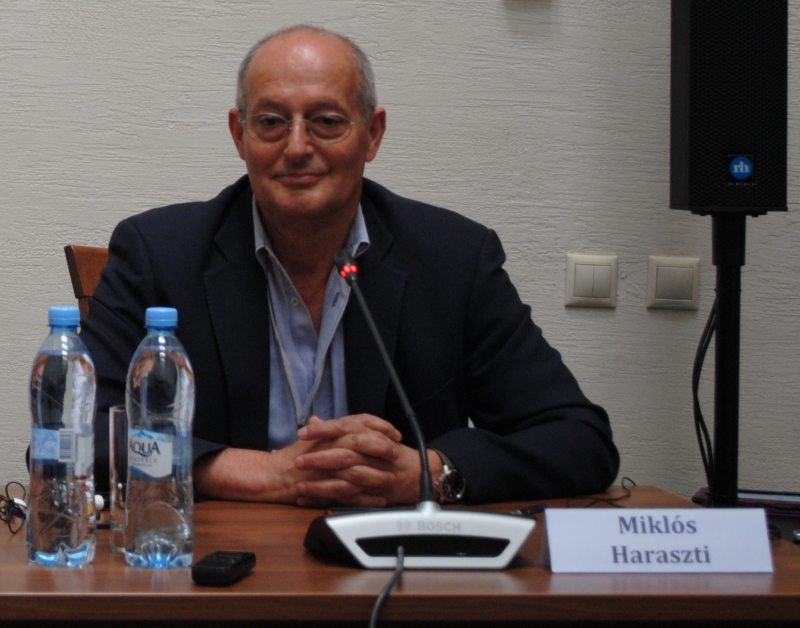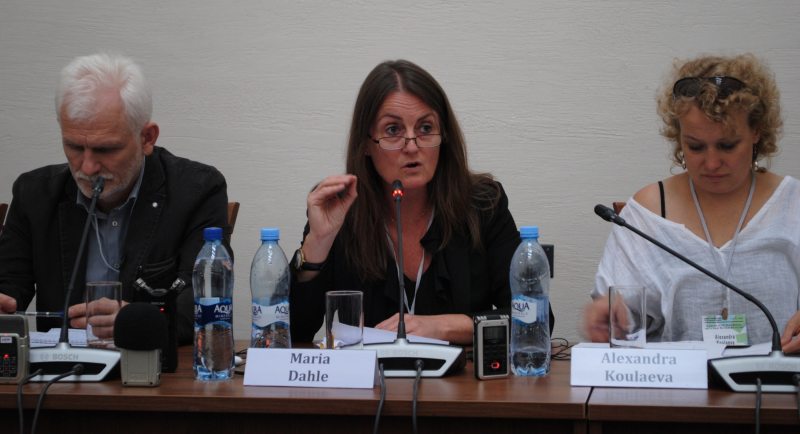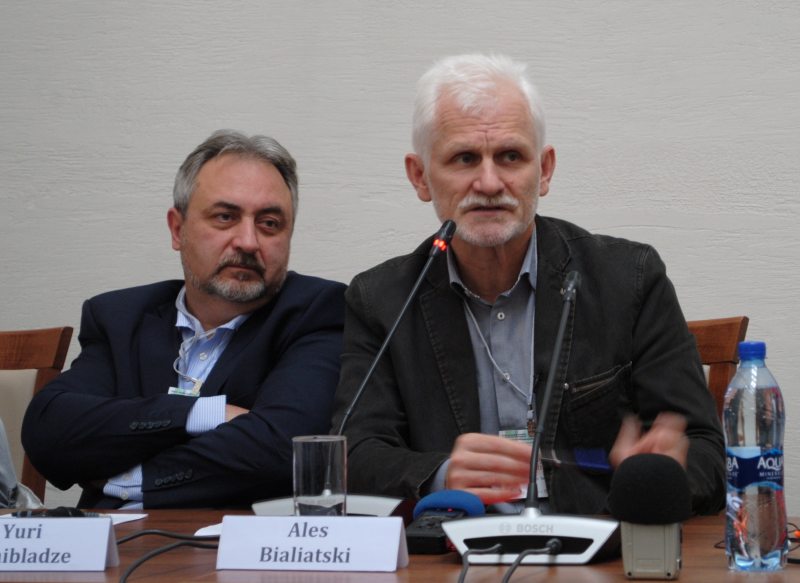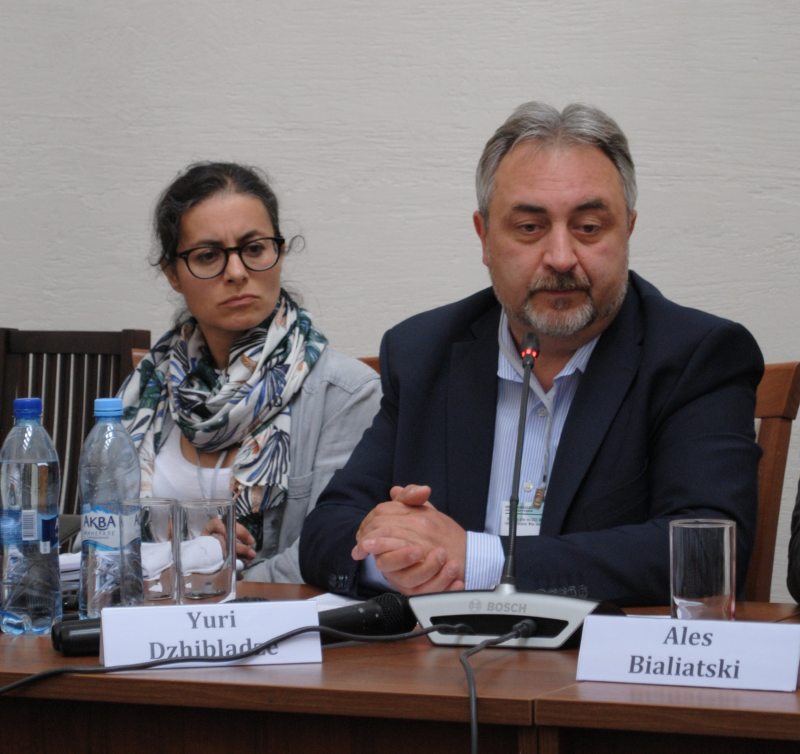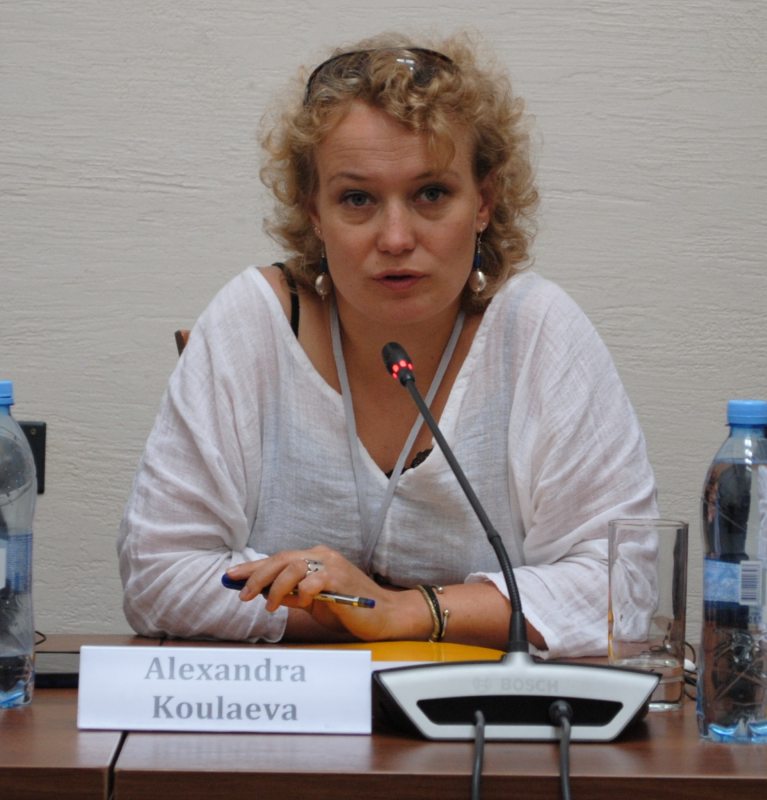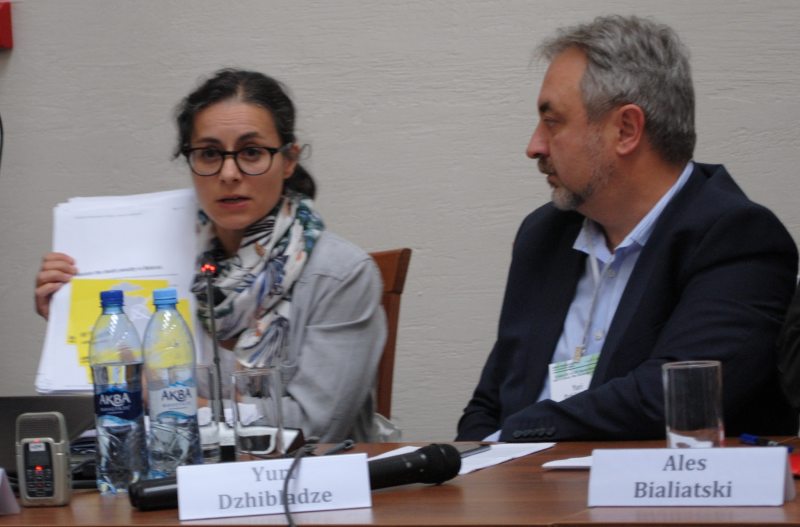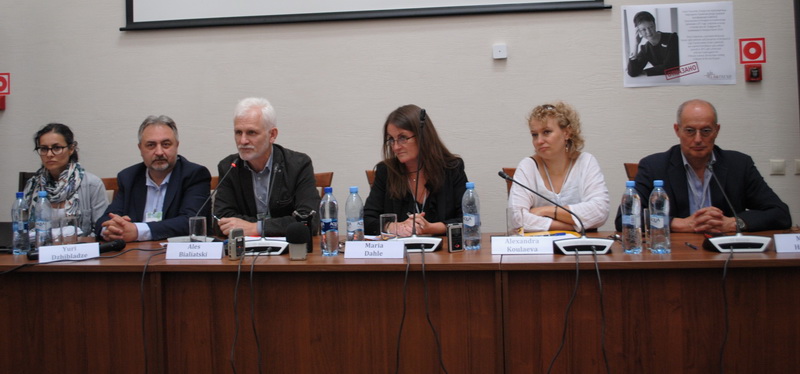
Miklós Haraszti said he was glad to visit Belarus even as an expert at a side event of the OSCE; however, he remarked the unwelcoming communication of the Belarusian officials.
“Their standing stays the same: Belarus does not recognize the mandate of Special Rapporteur and do not intend to cooperate.”
Miklós Haraszti expressed his hope that after the OSCE event the human rights situation in Belarus will change for the better.
Maria Dahle, representative of the Human Rights House Foundation, spoke about the global tendencies in human rights defense in Belarus and in the region, underlining increasing and more sophisticated pressure on human rights defenders.
“Human rights defenders are increasingly under threat in this part of the world, but it’s not only here, it is global decline in rights and freedoms. Repressions are going on for many years in countries such as Russia, Azerbaijan, and Belarus in this region. Repressions are becoming more frequent and more severe. The authorities are becoming more sophisticated in the methods they use against civil society.”
“We see harassment, attacks, the use of legislation to criminalize the work of human rights defenders. They put restrictions on travel, on funding, in particular, on foreign funding and operations of organizations. And this is something systematic in the region.”
According to Maria Dahle, the most targeted groups in the region are human rights defenders working on women’s rights, minority rights, rights of LGBT people and sexual minorities, and human rights defenders working on corruption issues.
“People in power don’t want to lose power. There is political power, financial power, they don’t want to lose the benefits that they have. What they do is they seek to silence the independent critical voices that are trying to increase the space of rights and freedoms with the civil society, to participate in the development of the society. We see the spread of fear, the spread of self-censorship, and we see the reduced activities by civil society as an effect, as a consequence of these actions by the government.”
“We see this shrinking space for civil society, we there are other NGOs, GONGOs, taking over the space – governmentally organized NGOs, set up to support the government’s narratives and policies. They are disrespecting the normal narrative and the call for to [promote] human rights, freedoms, what is done by independent civil society.”
The chairperson of HRC Viasna Ales Bialiatski underlined the unique character of the Forum, stating that this is the first event in 13 years, gathering human rights defenders and civil activists from different organizations and regions.
“Ahead of the session of the PA OSCE, we decided to unite our voices and reiterate our views of the existing human rights issues in Belarusian society. The civil society has recently adopted the “Position of Belarusian Human Rights Organizations” listing the current problems: political prisoners, death penalty, large-scale repressions in spring this year that touched civil society and civil activists, and systemic violations of human rights undergoing in Belarus.
We state there is lack of measures aimed to improve human rights situation at systemic level. The Republic of Belarus did not take efforts to implement urgent restorative measures, which Belarus human rights community has repeatedly demanded. Any moment, the situation might regress, get worse. So, our Forum is such a call, in the first place, for Belarus government to implement international human rights obligations.
We also call on the international community to keep an eye on human rights in Belarus. Belarus is a country neighboring to European states, and part of collective systems, like OSCE. Moreover, Belarus has undertaken certain obligations in the sphere of human rights, so it has to observe them. This our general message, and we hope it will be lived up to.
Our Forum is attended by various representatives, including deputies of the Parliamentary Assembly, Vice Chair of the PA OSCE, and Mr Haraszti is present here, as well as representatives of many authoritative international human rights organizations. Unfortunately, there are no Belarusian officials here. This agains underlines that today they are not striving to sit at a virtual or real negotiation table to discuss burning issues existing in Belarus,” said the human rights defender.
Yuri Dzhibladze underlined the importance of the event:
“If I had been told a year ago that we would organize an international conference here today – I would not have believed. Thanks God, today it is convenient for Belarus authorities to take symbolic steps. Without changing the nature of the power and the political system, but still take these steps: allow the Special Rapporteur, even with conditions, to visit the country; to allow the Forum. It is good that none Belarusian civil society leader is in prison. And even I have been able to come to Belarus for the first time within six years, as I had been under entry ban before.
The speaker remarked that the human rights situation and the rule of law are in decline currently, as governments and politicians and even representatives of international organizations shift attention to safety issues linked with real problems – terrorist threats, migration crisis and war in the East of Ukraine.
“The whole complex of problems distracts attention from human rights, and on the other hand, it is successfully used by authoritative leaders in many countries of the region.”
“At the background it follows that the voice of civil society is growing especially significant. Many OSCE members, PA members, politicians from different countries share our views and can ground on our conclusions, recommendations, documents that allows them to counteract to negative tendencies. That is why civil society and human rights defenders and activists are increasingly exposed to harassment, pressure, attacks and risks. We in fact deal with unprecedented pressure, with the narrowing space for civil society all over the world, and we have to pay more and more attention to this issue, to support, to solidarity, to defense of our colleagues alongside with fighting negative tendencies,” said Yuri Dzhibladze.
Head of the Eastern Europe and Central Asia Desk of FIDH Sasha Koulayeva remarked the step forward taken by Belarus authorities with the political, economic and geopolitical challenges faced by the country, and that the Forum did take place.
“I have to underline that after the Forum guests leave, our attention on Belarus will be especially intense, as experience shows the cycling nature of repressions in the country.
“An important issues us that no systemic changes have taken place that would prevent human rights violations in future, which has been proved by the spring events this year, when not only peaceful assemblies were brutally dispersed, but the following trials demonstrated dependence of the judiciary on the executive authority. In this context, one cannot speak of real progress.”
Sasha Koulayeva remarked they could not help greeting the release of several people from jail, however, the very release shows quite a volatile treatment of the judiciary:
“It is unclear how people charged with such serious crimes could be set free that easily, without explanations. As well as the question is open how the opposition leader Mikalai Statkevich, arrested before the demonstration, was released from the KGB detention facility without any explanations, when the need [to hold him there] expired”.
The FIDH representative also mentioned the issue of remaining death penalty in Belarus:
“This is a tough challenge to the whole OSCE region, since only two countries in the space keep the practice of capital punishment. And the dependence of the judiciary, which I mentioned before, is obvious at every stage of sentencing a person to death penalty: from the moment of detention, to granting a lawyer at an early stage, conditions of imprisonment, and finally, the possibility of appeal which in fact does not exist.”
Amnesty International representative Aisha Jung stressed that her organization condemned the mass repressions in March and April.
“The response of the authorities to the peaceful protests was extreme even by the Belarusian standards.”
“Amnesty International has documented now for many years and spoken up against the violations of freedom of assembly, association, and expression in Belarus. This latest wave of repression signals at disappointing regression by the authorities, in response to which Amnesty International strengthens its calls that these rights have to be respected and protected and for Belarusians to get organized and participate in peaceful protests without interference.”
Aisha Jung also mentioned the issue of death penalty in Belarus alongside with 40 years’ anniversary of Amnesty’s campaign against death penalty:
“In that time we see huge global momentum towards abolition both internationally and also in the post-Soviet space, leaving only Belarus sole executioner in Europe and in former Soviet Union. Quoting the international community on this subject: “Belarus simultaneously demonstrates total disregard to its institutions, with five men executed since 2016, three of whose cases were pending at the Human Rights Committee.” It’s the highest number of executions since 2008.
Secrecy surrounding the death penalty in Belarus amounts to ill-treatment of the families, and Amnesty calls for the secrecy to be lifted and families to be called to final meetings; to ensure clarity on the dates of execution, and further disclosure of burial sites of their loved-ones.”
When in November 2016 three persons were executed, Amnesty launched an international campaign calling for an immediate moratorium on death penalty.
“I have the results of that campaign here: we’ve gathered over 18 thousand signatures from around the world calling on the Belarusian authorities to introduce an immediate moratorium on death sentences with the view to full abolition. Amnesty is opposed to death sentences under any circumstances. It constitutes inhumane and degrading treatment and is a violation of the right to life. … We remain committed to see full of abolition of death penalty in Belarus and this will be focus of our wok for the next couple of years, alongside the 40-year anniversary of our campaigning on this issue.”

